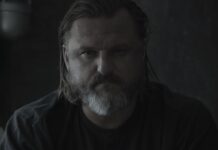Welcome to an exclusive music production interview with the talented DJ and Producer, Nicholas Gunn. With a rich and diverse career spanning several decades, Nicholas has consistently pushed the boundaries of the Experimental, Ambient, Chill House, and Trance genres.
In this interview, we have the privilege of exploring the origins of his passion for music production, and his remarkable evolution as an artist within the ever-changing landscape of the Electronic music industry.
We delve into the heart of Nicholas Gunn‘s creative process, as he shares valuable insights, experiences, and the profound influences that have shaped his signature sound. Join us as we unveil the mastermind behind the music, embracing the simplicity and depth of his musical journey.
Hi Nicholas! How are you?
I am well, thanks for asking!
We’d like to start by asking, what initially sparked your passion for music production, how did you embark on your journey in the Electronic music scene?
For me, the goal was to always get my ideas sounding as best as possible. When I first started recording there was no digital. Just open reel tape decks and massive analogue consoles. But that was romantic, you know?! All that incredible gear made it a hands-on experience and it was far more tactile. I grew up in that kind of production world and it fueled me. Expensive as hell, but that’s what I did.
A true gear slut to the full extent of the word. My career started in the early 90’s with mostly acoustic music as electronic instrumentation was very limited. It forced me to learn mic placement, tape saturation techniques, and basic signal path flow and how to get the most out of a production with 24 tracks and a bit of MIDI. It’s shocking what you can accomplish when you have fewer choices.
I was under exclusive record deals throughout the 90s doing world and instrumental styles of music. As the early 2000’s came about I was hanging out in the clubs, standing on the dance floor saying to myself “this music is amazing” and wondering how I could be a part of the emerging Electronic culture. I’ve done a tremendous amount in the music industry, including losing a lot. It was after one of those losses when I decided, it’s now or never, and I started the transition to electronic around 2016.
As an artist with a diverse range of musical influences, how do you navigate the process of blending genres and creating a unique sound that pushes the boundaries of electronic music?
I consider myself a songwriter before I consider myself a producer, and it works well that way because you’ll hear me in everything I put out, no matter the genre. I just make sure everything is produced well and sounds amazing according to what genre I am aiming for. In the case of my ambient instrumental works, I have greater liberty and just go where the music takes me. Trance, Chill, and Melodic House is a far more focused approach.
And as a label owner and curator of Blue Dot Music, what qualities do you look for in artists and their productions when considering them for your label?
Great songwriting is number 1 for me. For every 1,000 producers and sound designers there’s just a few that are great songwriters, as well. That’s what I’m always looking for. It’s all about the song. Production and sound design are critical, but they support the song, not the other way around. I believe if an artist has that kind of priority, it becomes a winning formula.
Music production is a constantly evolving field. How do you stay inspired and continue to innovate in an industry that is driven by trends and changing tastes?
I surround myself with young, talented people. Remain open to change. And then make that change a part of the artist that I already am. It’s that simple.
The transition from the pre-digital age of music to the current Electronic music market has been significant. How have you adapted your style and approach to cater to the modern audience while maintaining your unique sound?
My writing style is still the same. I’m still inspired by the same things and use the same type of melodic composition I have always done and that’s kind of the backbone of my artistry and sound. The rest required a tremendous amount of homework on my part. I studied the new techniques being used. Worked with the new programs and tools that were being implemented and then learned, as an artist, how to integrate that knowledge into my music. You have to do the homework and there are no shortcuts.
In what ways do you incorporate the theme of nature and its relationship with humanity into your music production? How does this reflect in your sound and compositions?
It’s everything to me. Everything resonates with a frequency. Earth, people, objects. We are what we absorb when it comes to frequency and sound. It affects every cell of our being and how we resonate with the world around us. Music and sound are, in my opinion, the highest form of art and expression of self. It’s already scientifically known that our cells are held together through vibrational frequency. Just as butter melts and ice turns to water when frequency (heat) is applied, this kind of metamorphosis also has a profound affect on our being. So, when I am in nature, I hear the music coursing through the leaves in the trees, through the valleys and canyons and in the sky above. It’s all around us and we can all tap in. When someone says “raise your vibrational frequency,” this has literal meaning. So, I am always taking everything in nature and in my own life, experiencing it, and translating it into music. All driven by love, compassion, and beauty.
What are your top 3 synthesizers for euphoric Trance style leads? What are your favourite elements of each and why does this make it stand out from all the other plugins on the market?
I’m one hundred percent in the box. For me, currently it’s DIVA, Spectrasonics, and Spire. I mess around with a bunch of others, but I find myself on these three instruments the most. Many producers freak out when you don’t modify a preset but for me it just needs to work in the mix. Layering is my big tool. Sure, I’ll dig in on modifying presets but there’s a golden rule that I work by and that is keep it simple. Each instrument has its pros and cons. I can manipulate so much in post that for me I am always looking for sounds that are incredibly unique that no one has found yet. If that means going deep on layering or modifying presets or simply creating my own, the goal is to be unique and have it work in the mix.
When producing a track, how do you usually begin the production? Do you start with melodic content and build around that? or do you lay down some drum elements?
Always with the song! I start with meaningful progressions that lead to a top line melody. I then phonetically sound out a top line which then leads to lyric writing. Building out the final track and production to support the song is a process that happens along the way and can change at any point. That’s why the song always wins in my opinion. A great song can transcend genre and go anywhere it wants.
What inspires your complex, deep melodies that are a prominent occurrence in many of your tracks?
My formal training, I believe. I studied at the Royal Academy of Music on the flute (counterpoint theory) at a very young age. Playing the great composers and understanding the importance of melody became like walking for me. It also allowed me to understand the epigenetic importance of melody in culture. The melodies that stick to us all. These melodies are imprinted in our DNA and we find these melodies appealing, on a larger scale. For example, Celtic melodies and their tonal inflection has a wide and deep influence on culture. Understanding the importance of this is critical to great melody writing.
Do you play any traditional instruments? How do you integrate these into your productions?
Yes, I’m classically trained. Flute, percussion, and piano are my main instruments and I use them in my musical composition to this very day.
Your productions have a lot of depth, what effects and techniques do you use to create such deep, atmospheric soundscapes?
If you fill a mix with a ton of sound you are covering up beauty. The magic is found in the spaces in-between the notes. How one note can hang over on a changing progression can create absolute magic in its subtlety. When we simply dump a bunch of chatter, arps, percussion and drums into a mix, we create chaos and noise. Reduce the noise and allow the beauty to come through. That’s the kind of technique I strive for. Plenty of layers and counter melody but plenty of space for it all to breathe.
Trance leads and Lead vocals can often be tough to mix due to them sitting in a similar place on the frequency spectrum, could you explain how you would usually go about mixing these two elements within a mix?
Frequency is only part of the problem and can be addressed through filtering top end with EQ (on arps, for example) to allow a vocal to come through. But most importantly, leads and vocals must give way to each other harmonically. One is a top line lead (vocal) the other is an instrument lead (arps). The idea that two melodies work together in harmony is called Polyphony and that technique was developed in the 1500’s by Palestrina. If two leads come together and clash melodically or sound muddled, then rework each so they complement each other when played together. Prydz is a master of Polyphony. As with everything in music, it’s often not what you think. It’s far simpler.
What do you believe is the most integral element when creating one of your songs? Is it vocals or melodic content? It may well vary depending on the nature of the track, please explain.
Undoubtably melody. Reoccurring, lasting, memorable melody always wins the race. Vocals that frame that melody perfectly, and then production that supports it all with lyric that vibes with the idea of the tune, creates an apex. The goal is to reach that apex on every tune. Trust me when I say this: you can make production errors on an incredible song and the fans will still love it. If the song is lacking and it has great production, your tech headed peers may love it, but it will get lost on the masses. It’s all about the song. Always about the song.
As we wrap up this insightful music production interview with Nicholas Gunn, we are left inspired by his passionate dedication to crafting emotive and boundary-pushing productions. His unique approach, blending genres and infusing nature’s essence into his soundscapes, is proof of his artistry.
Nicholas Gunn‘s commitment to meaningful songwriting, paired with his mastery of production techniques, ensures that each track resonates deeply with listeners across the globe. As he continues to pave his path in the ever-evolving Electronic music scene, we eagerly await the next chapter of his musical journey.
Keep an eye out for his latest releases and live show dates, as Nicholas Gunn continues to captivate and intrigue music enthusiasts worldwide.


















